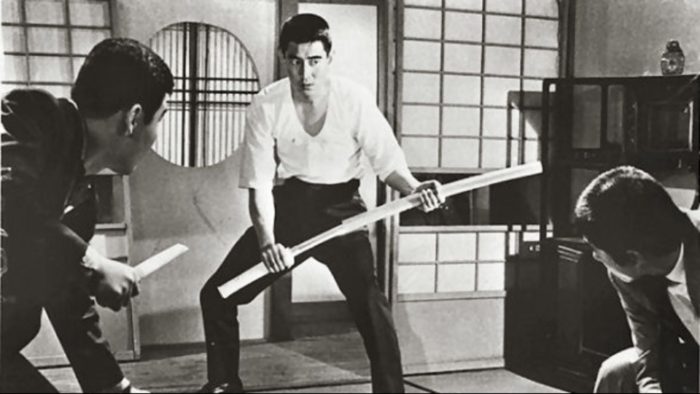An actor shouldn’t really die. An actor should die in his movies. He should die within the story. Then in another movie he can come back to life again.
Shuji Terayama; from Farewell to the Ark.
https://www.youtube.com/watch?v=-sYmnqI3uI0
“I Love You, Ken-san”
Lyrics by Shuji Terayama; music by Kuni Kawauchi; sung by Tetsuro Kawasuji; from the soundtrack of Throw Away Your Books, and Run into the Streets (1971). English lyrics are as follows.
I love you Ken-san
In a late night cinema
That smells of piss
On the ugly outskirts of town
As I lick a lollipop
I like watching you slice them up
“It’s time for you to die”
“It’s time for you to die”
“It’s time for you to die”
“It’s time for you to die”
Ah, just thinking about it
Sends shivers down my spine
I’ve never sliced up anyone
I’ve never even owned
A knife for sashimi
I’m scared of strangers
I have chronic anaemia
I easily burst into tears
I make only 20,000 yen a month
I haven’t got a boyfriend
I haven’t got any courage
I haven’t got an apartment
My regular nesting place
Is this late night cinema
“I’m gonna take your life”
“I’m gonna take your life”
“I’m gonna take your life”
“I’m gonna take your life”
Ah, that really gets me going
I love you, Ken-san
If I were a man
One time at least
I’d like to kill somebody
One time at least
I’d like to kill somebody
The great Ken Takakura, who passed away in November 2014, was an iconic figure in Japanese films. In his later years he specialized in strong-and-silent characters who were misunderstood by society, but basically noble – such as the reformed prisoner in The Yellow Handkerchief. In 2013 he received the Order of Culture from Emperor Akihito in recognition of his contribution to Japanese cinema.
But that was not the Ken Takakura that Terayama describes in this 1971 song. During his earlier period with the Toei film studio (1956-75), Ken-san was famous for playing desperate, violence-prone outlaws – gamblers, yakuza, hitmen and the ruthless villain who plans to derail a shinkansen in The Bullet Train (1975).
The theme song of the Abashiri Prison series – sung by Ken-san himself, who stars as a multiple escapee – was briefly banned on account of its anti-social, criminal-glorifying lyrical content. In real life Ken-san was on familiar terms with a top gangland figure who he went on to play on the silver screen.
There also were persistent rumours, never substantiated, that Ken-san was bi-sexual. In the song Terayama plays on the sexual ambiguity of the unsmiling tough guy with the smooth, sculpted pectorals. Although written from the viewpoint of a lonely woman, the song is always sung by a male. Another version appears in the gay-themed musical Baramon (“Gate of Roses”) that Terayama produced in 1975, this time sung by a man using the female name of Asuka.
Cross-dressing and gender confusion play an important part in Terayama’s films and he was a supporter of Barazoku (“Rose People”), Japan’s first gay magazine, which was launched in 1971.Traditionally Japan had no objection to homosexual activity; the criminalization of sodomy that came in with a Western-style legal code in 1872 was repealed eight years later. Even so the gay sub-culture remained in the shadows until the 1970s, which gave it the outsider status that Terayama exalted.
Yet it was not Terayama himself who established Ken-san as a gay icon, but a man who was briefly an actor in Terayama’s avant garde theatrical troupe and also designed some of its ground-breaking posters. In the late 1960s the soon-to-be-famous artist Tadanori Yokoo produced a series of works that utilised Ken-san’s image in a similar way to Andy Warhol’s appropriation of Elvis and Marilyn Monroe – but with rather more artistic flair.
You can buy the postcards and other Tadanori Yokoo merchandise here.
In the movie called the world
Falls the rain, rain, rain
Floating on the pool
Is my dead body
“You’ve gone too far, Shadow”
Shuji Terayama; from The Man Whose Hair Fell Out

